| ID |
Date |
Author |
Category |
Subject |
|
41
|
Wed May 11 07:28:39 2022 |
Simon, Christopher, Shahab | General | DAQ Loop for shifters |
Procedure:
- Scanning phase ends (on LabView wait until "Idle Status" blinks. it will show e.g. 8 loops and 44 scans)
- on DAQ2 (Carsten) and DAQ1 type (simultaneously):
sto ac
- on DAQ2 (Carsten) and DAQ1 type:
clo fi
exit
- on DAQ1 computer, stop GO4 and close it
- on DAQ2 (Carsten) and DAQ1 type:
resl
mbs
@startup
- on DAQ1 computer, start GO4
go4&
- request new injection (move the green slider to red, wait for machine to go further, then move it back to green)
ESR_EXP22_03_209Bi83_Laser_06May.C1.9_WAIT_FOR_MANIP_BY_OP
- in Lassie Monitor, remember the value of SIS-Trafo (GS09DT_ML) after injection, and put it later in the elog table
- wait until the ion beam is cooled (look at the Schottky monitor)
- on DAQ2 (Carsten) and DAQ1 type (simultaneously):
sta ac
- on LabView press on button
Start Scan
- Scanning phase starts.
- you can show the status (and also the current filename) by using the command
sh ac
- update elog with SIS Current, Filenames, and time
- restart from top |
|
48
|
Wed May 11 22:04:30 2022 |
Phillip, Wilfried, Max | General | spacial laser - ion overlap verified |
After the SIS/ESR optimization we checked the spatial overlap with the T-scrapers again.
The values are:
|
device | move in dir. | scratch (mm) | gone (mm)
| |
GECEDS1VU | up | -3.0 | -2.2 |
| |
| | | |
| |
GECEDS1HA | right | -22.9 | -22.0 |
| |
| left | -11.0 | -13.0 |
| |
| | | |
| |
GECEDS2VU | up | -4.5 | -2.7 |
| |
| | | |
| |
GECEDS2HA | right | -21.0 | -19.6 |
| |
| left | -7.8 | -8.4 |
|
The beam position is approx. as before. The laser position is still good and we have spatial overlap. |
|
50
|
Wed May 11 22:45:22 2022 |
Max, Wilfried, Patrick | General | scanning wavelength |
The scan parameters for the next shift are:
in COBRACONTROL:
increment: 0,005nm
from position: 601,62nm
to position: 601,405nm
These are the wavelengths in air!
The wavelength in vacuum we expect is: 601.832nm
You can check the current wavelength in vacuum on the wavemeter in the LabView GUI.
edit: In the night shift, we checked the scanned vacuum wavelengths in the wavemeter and also checked the expected transition wavelength.
The resonance should be very much in the center of the above mentioned scan range.
The increment corresponds to 4.1 GHz steps. Is this small enough? |
|
56
|
Thu May 12 10:21:30 2022 |
Ragan, Shahab, Simon, Sebastian, Christopher, Wilfried | General | No Beam |
There is no beam in the ESR due to some problem in the UNILAC. |
| Attachment 1: Screenshot_from_2022-05-12_09-21-38.png
|
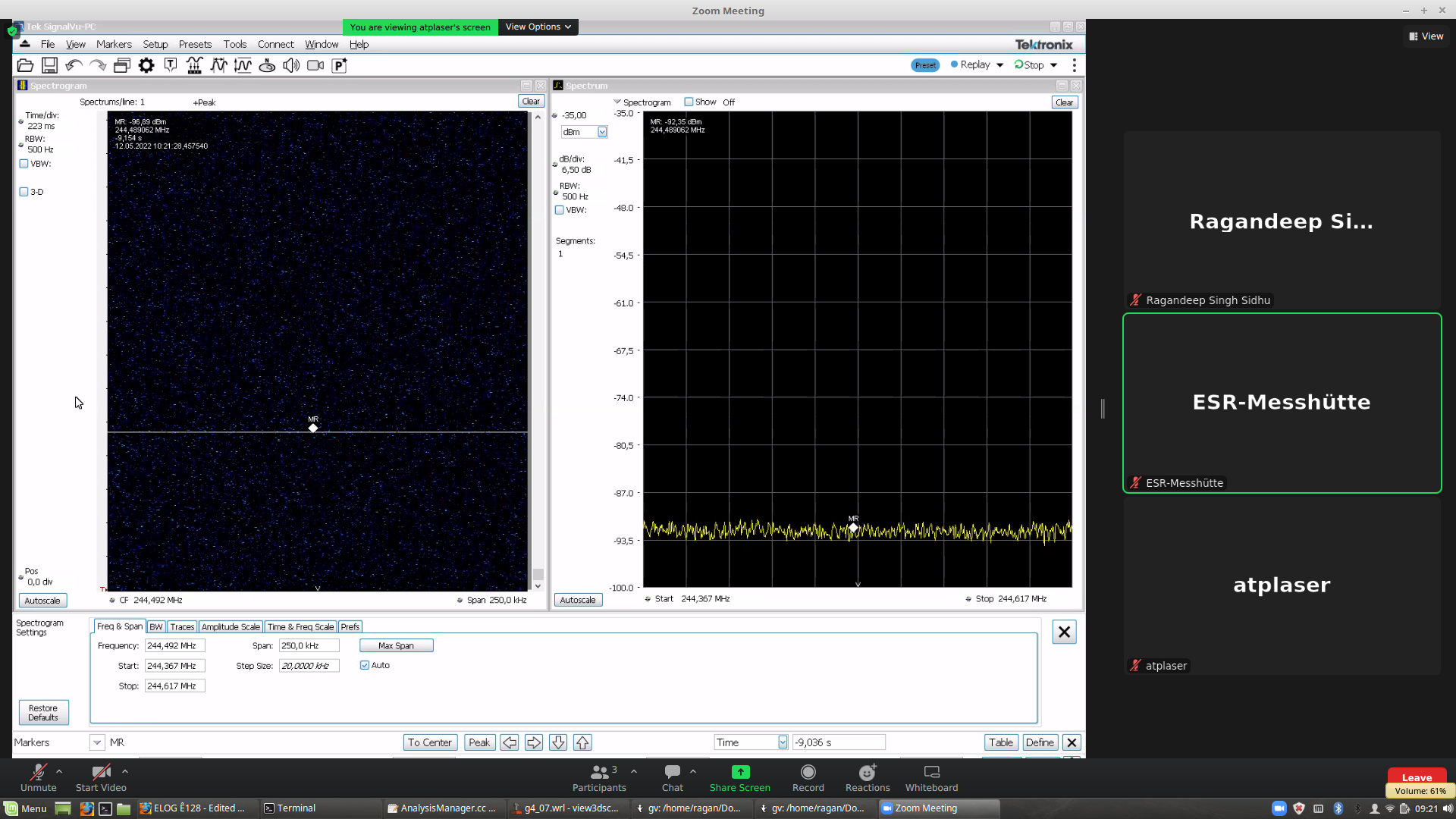
|
|
57
|
Thu May 12 11:30:18 2022 |
Ragan, Shahab, Simon, Sebastian, Christopher, Wilfried | General | Beam is back |
Beam is back in the ESR. |
| Attachment 1: Screenshot_from_2022-05-12_10-32-24.png
|
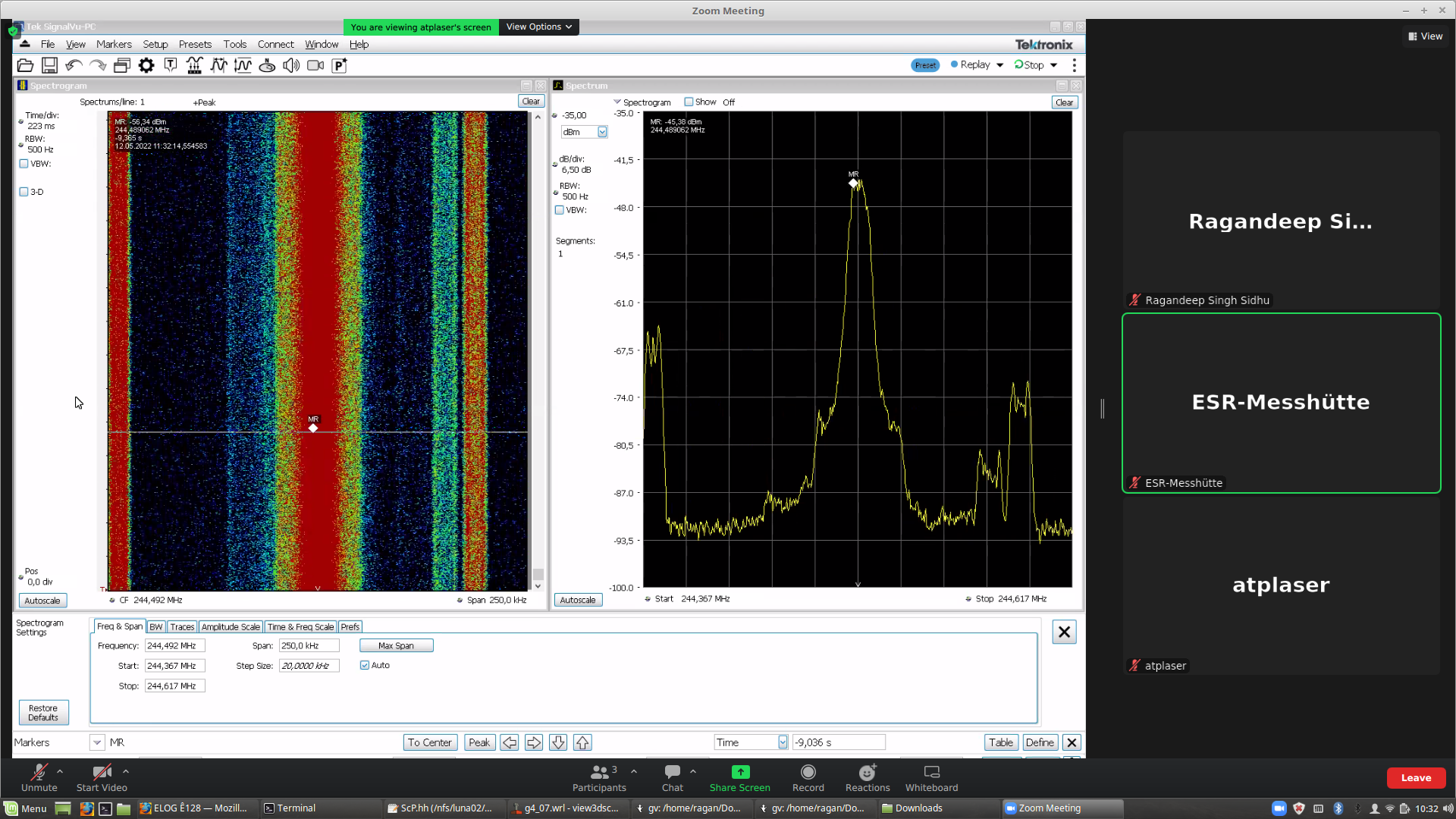
|
|
58
|
Thu May 12 11:31:11 2022 |
Simon, Christopher, Shahab, Wilfried, Sebastian, Ragan | General | Runs morning shift |
|
Time | SIS-intensity | ESR-intensity after orbit change | cooler-HV | LMD-DAQ2 file nr | LMD-DAQ1 file nr | scan range(nm) | step width increment (nm) | dwell time(s) | n loops | comments
| |
11:30 | - | 8,2e6 | 223219 | 497 - 500 | 8119 - 8119 | 601.62 - 601.405 | 0.005 | 5s | 6 | after this run we had to give the ESR Group the beam
| |
|
|
|
59
|
Thu May 12 12:02:56 2022 |
Ragan, Shahab, Simon, Sebastian, Christopher, Wilfried | General | No beam |
There is no beam in the ESR again. |
| Attachment 1: Screenshot_from_2022-05-12_11-02-37.png
|
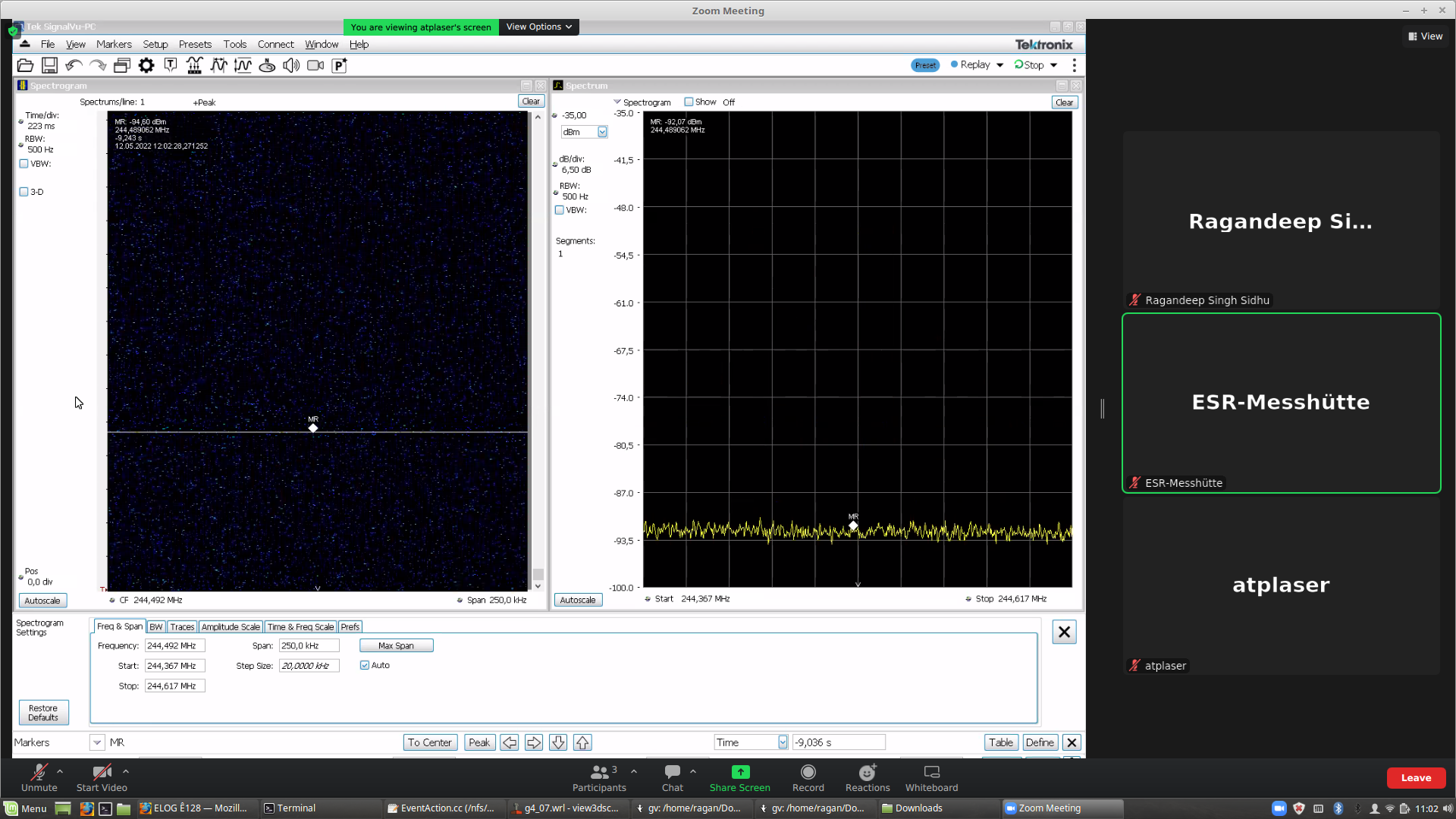
|
|
60
|
Thu May 12 12:51:30 2022 |
Ragan, Shahab, Simon, Sebastian, Christopher, Wilfried | General | Beam is back |
12:50 Beam is back again in the ring.
12:52-until now Kicker problem in the ESR. |
| Attachment 1: Screenshot_from_2022-05-12_11-51-35.png
|
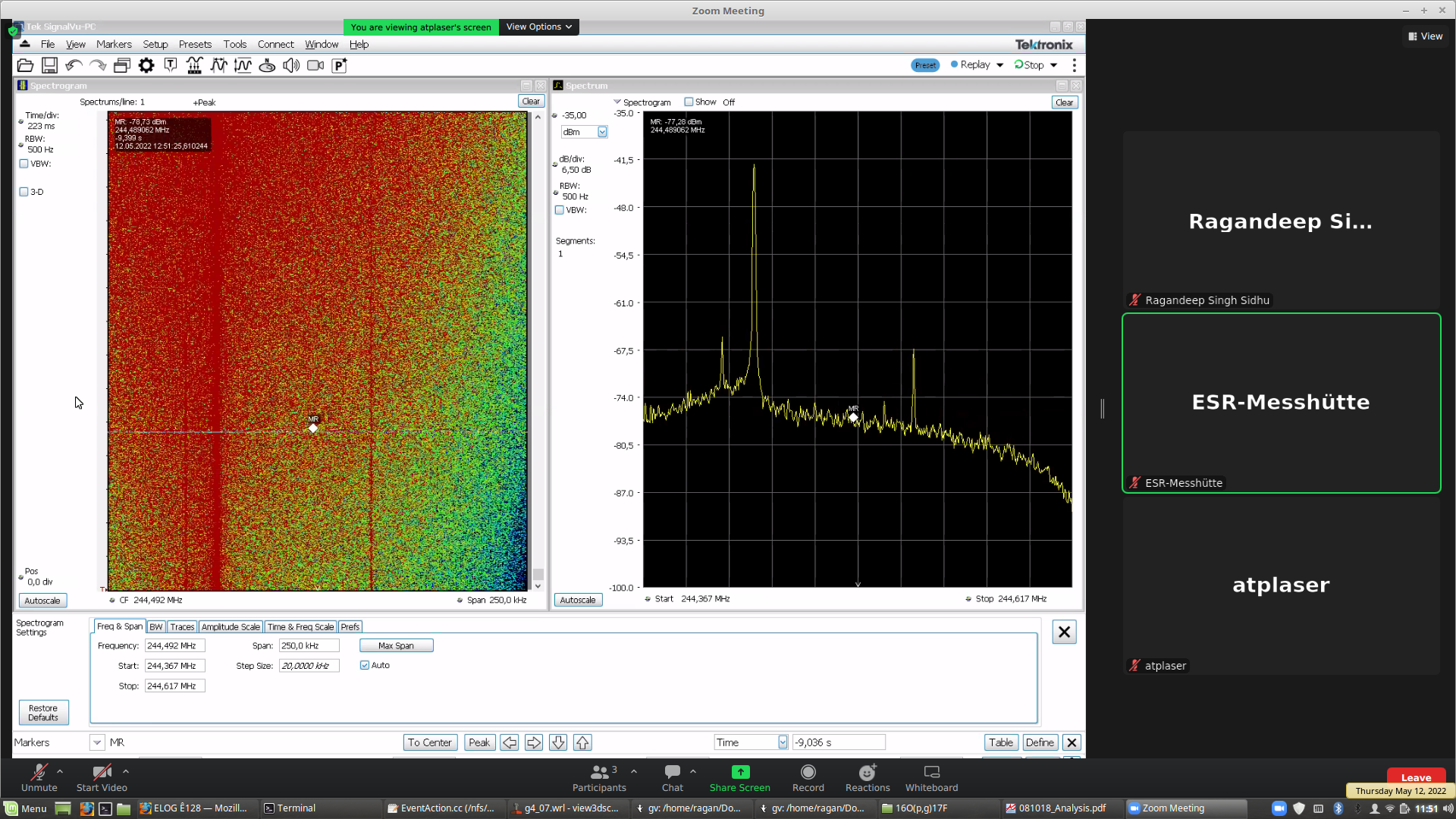
|
| Attachment 2: Screenshot_from_2022-05-12_12-08-52.png
|
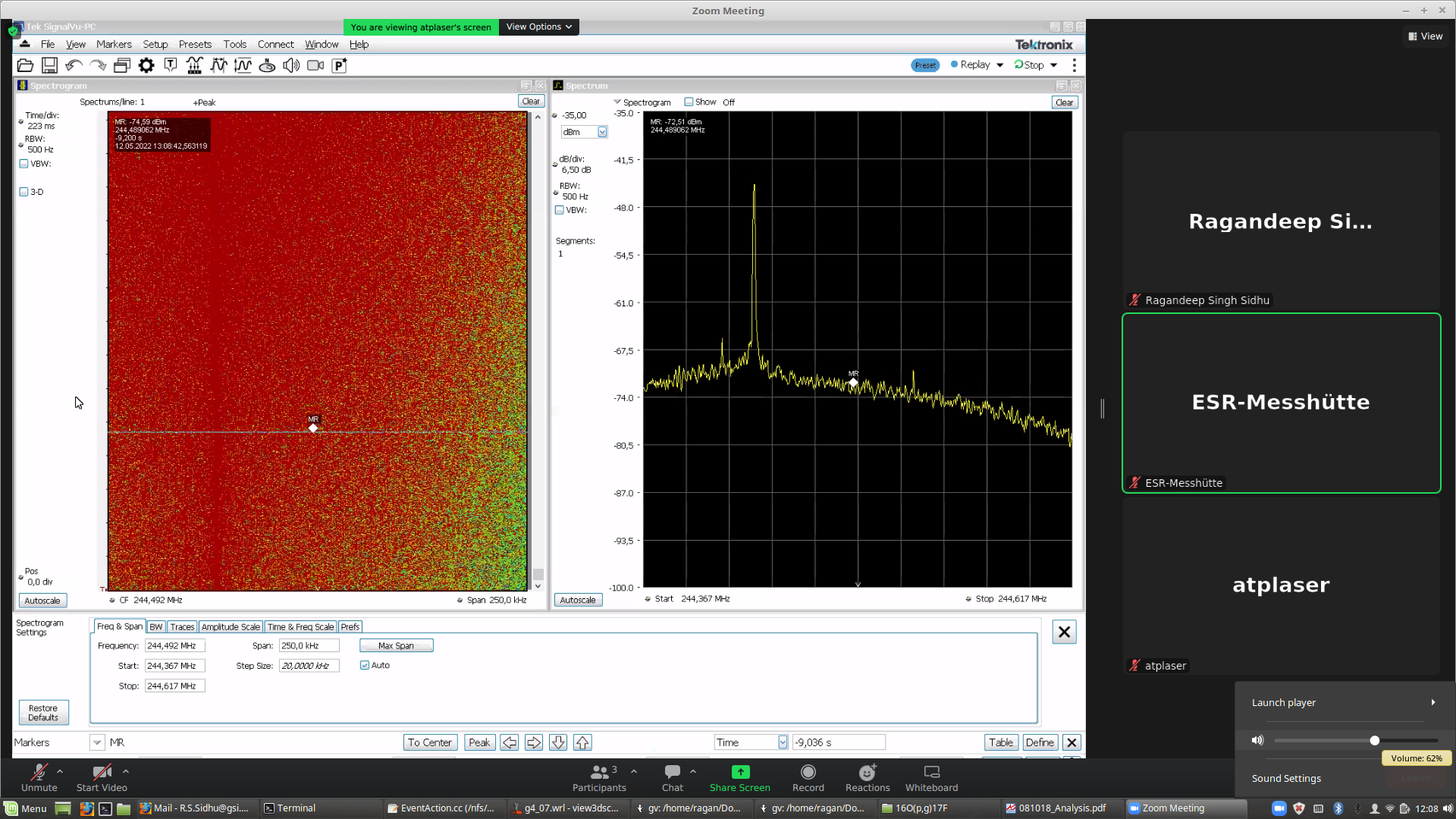
|
|
68
|
Fri May 13 16:55:58 2022 |
Danyal, Carsten, Phillip, Wilfried | General | End of E128 Beamtime |
Dear all,
unfortunately, the E128 experiment must now come to an early end.
The problem(s) with the injection septum are severe and no work around solution (with acceptable risks) could be found.
Several things were tried, but without hope.
Many thanks to everybody involved during the preparation time and the shifts during the beamtime.
Best wishes,
Wilfried |
|
69
|
Mon May 16 14:20:05 2022 |
Ragan, Danyal, Carsten, Phillip, Wilfried et al. | General | E128 Beamtime |
> Dear all,
>
> unfortunately, the E128 experiment must now come to an early end.
> The problem(s) with the injection septum are severe and no work around solution (with acceptable risks) could be found.
> Several things were tried, but without hope.
>
> Many thanks to everybody involved during the preparation time and the shifts during the beamtime.
>
> Best wishes,
>
> Wilfried
There is beam again in the ESR. The plan is to take beam until tomorrow morning. |
|
72
|
Mon May 16 17:38:38 2022 |
Max, Danyal, Wilfried, Rodolfo | General | laser bunch timing |
We overlapped the laser and ion bunch in the time domain.
Therefore we delayed the bunching HF in order to see the PMT signal between bin 10 and 22. Before the signal Peak was in channel ~145-5 and difficult to gate on.
Afterwards we also have to shift the laser.
The new values are:
PD NO: 77.5
PD SO: 113
Ion bunch: 16.5 |
| Attachment 1: timing1605.png
|
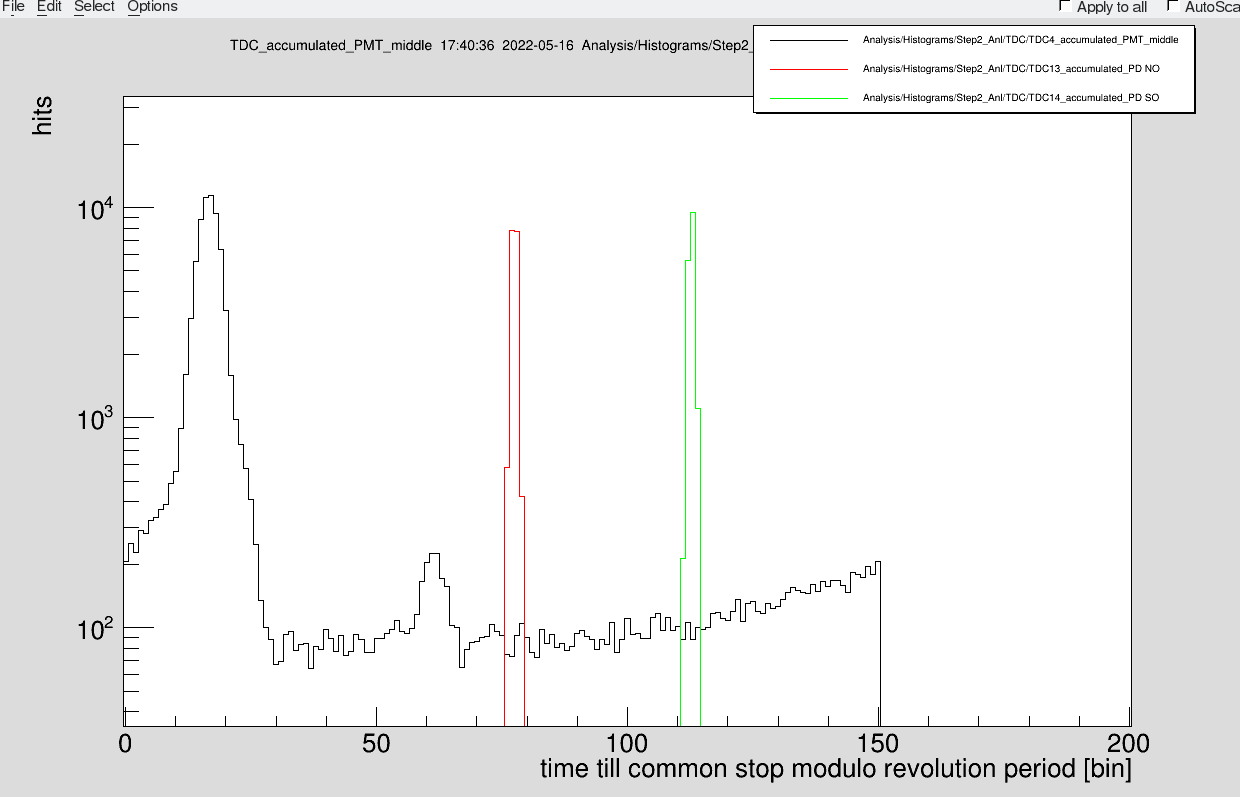
|
|
91
|
Mon May 30 19:00:19 2022 |
Carsten | General | Scraper Settings and Parameters for the last measrements with thick target |
old Bunch frequency: 1.98777 MHz
Positions PL devices:
|
GE01DD2AG | -23
| |
GE01DD2IG | 3
| |
GE02DD2_G | -35
| |
GE02DS3HG | 0
|
The voltages of the particle detectors were set to:
SA_SZ: 1500V
NA_SZ: 750V
But for the primatry beam measurements the detectors were still switched off
Set values for cooler:
SC3: 223513.377 + DeltaU = 160V
SC6: 223452.14 + DeltaU = 130V
SC9: 223452.14 + DeltaU = 130V
Electron current:
SC3: 300mA
SC6: 100mA (300mA in the second file)
SC9: 100ma (300mA in the second file)
Cooling in SC4: 550x
Cooling in SC7: 50x
Explanation of subchains:
SC4: Cooling at injection orbit
SC5: Ramp to central orbit
SC7: Cooling at central orbit
SC8: Scrapers /particle detectors in, XUV detector in, (~10s), bunching on
SC9: measurement
SC10: not used
SC11: Scrapers/particle detectors/XUV ectros out (~10s), bunching off |
| Attachment 1: screenshot-2022-05-30_19-12-151030168345517073342_(002).png
|
.png.png)
|
|
94
|
Mon May 30 21:52:08 2022 |
Wilfried, Danyal, David, Rodolfo | General | Position of T-Scrapers |
We have determined the position of the H-like 208Bi ion beam using the T-Scrapers. The position actually did not change in comparison to the position of H-like 209Bi.
Here we have the values where the beam was "gone"
|
device | move in dir. | gone (mm) | x0 (mm)
| |
GECEDS1VU | up | 0.7 |
| |
| | |
| |
GECEDS1HA | right | -22 | -4.7
| |
| left | -13.0 |
| |
| | |
| |
GECEDS2VU | up | 0.0 |
| |
| | |
| |
GECEDS2HA | right | -18.5 | 3.1
| |
| left | -9.5 |
|
Below you can see a screenshot with the settings of the beam stabilization system. |
| Attachment 1: MRC_208Bi_30-05-2022-10Uhr.png
|
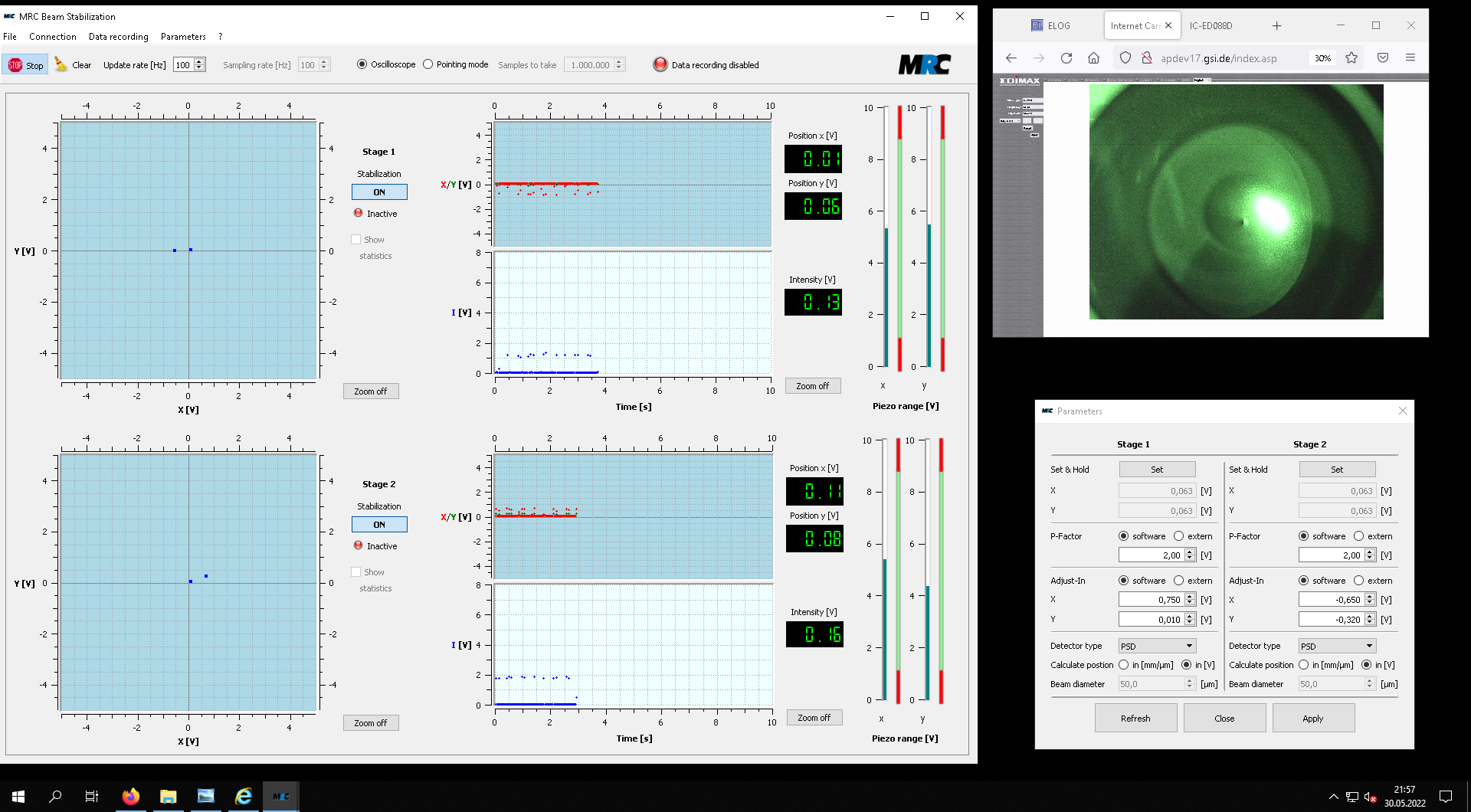
|
|
98
|
Tue May 31 15:19:58 2022 |
Max, Carsten, Danyal | General | scans for different E-cool currents |
until 15:15 we have measured with I_e = 100 mA (3 loops per file)
E_cool HV = 225255 V
after that (at 15:26) we changed to I_e = 200 mA (2 loops per file)
E_cool HV = 225272 V
after that (at 17:15) we changed to I_e = 50 mA (first 4 then 6 loops per file)
E_cool HV = 225247 V |
|
99
|
Tue May 31 17:22:09 2022 |
Max, Carsten, Danyal, Rodolfo, Wilfried | General | change E-cooler current I_e = 50 mA |
At 17:15 we changed again the E-cooler current I_e = 50 mA
(4 laser scan loops per injection)
E-cool HV = 225248 V |
|
6
|
Tue Apr 26 18:15:19 2022 |
Rodolfo | Detectors | XUV-Detector and Cu-Mirror |
Concerning the moveable detectors:
- I have switched off the power supply and cooling (heat exchanger) for the Cu-mirror.
- The heat exchanger for the XUV-detector is still ON. The water level in the heat exchanger is still OK. |
|
14
|
Fri May 6 16:29:03 2022 |
Simon, Patrick | Detectors | PMT preparation |
We changed PMT north and PMT south and tested them at 1500 V.
Both new PMTs are broadband.
PMT north and middle see between 2 and 7 kHz signal rate with a threshold close to the background noise.
PMT south still has the plastic cap on and is intended to be used as a reference for electro-magnetic disruptions. No signal was seen at 1500 V.
We fixed the signal cable of PMT south to the NIM-crate to get rid of background noise picked up by the cable. |
|
19
|
Mon May 9 16:58:41 2022 |
Carsten | Detectors | Voltage particle dectectors NA_SZ und SA_SZ switched on |
Voltage SA_SZ (capture behind cooler): 1500 V (thin plastic scintillator)
Voltage NA_SZ (capture behind target): 750V (thick plastic, short absorption length)
Voltages and thershholds from thorium run, still to be verified. |
|
29
|
Tue May 10 20:35:42 2022 |
Phillip, Wilfried, Max | Detectors | PMT Threshold |
Since we have ions in the ring now, we looked at the PMT thresholds and the widths. In order to do so we looked at the Raw Signal directly before the CFD and its output simultaneously. You can now set the threshold just above the noise. If the threshold is too low you will also see flat lines in the oscilloscope when triggered on the CFD output. New values:
PMT Mitte
---
Width: 200 -> 220 (60ns -> 90ns)
Threshold: 20 -> 5
PMT Nord
---
Width: 200 -> 220 (60ns -> 90ns)
Threshold: 12 -> 10
PMT Süd
---
blind. |
|
45
|
Wed May 11 18:00:40 2022 |
Wilfried, Phillip, Max | Detectors | double PD NO peak problem solved |
In entry 36 one finds an additional PD NO peak around bin 100.
This was caused by signal reflection in the cable.
The problem was solved by adjusting the CFD threshold from 10 to 30.
|